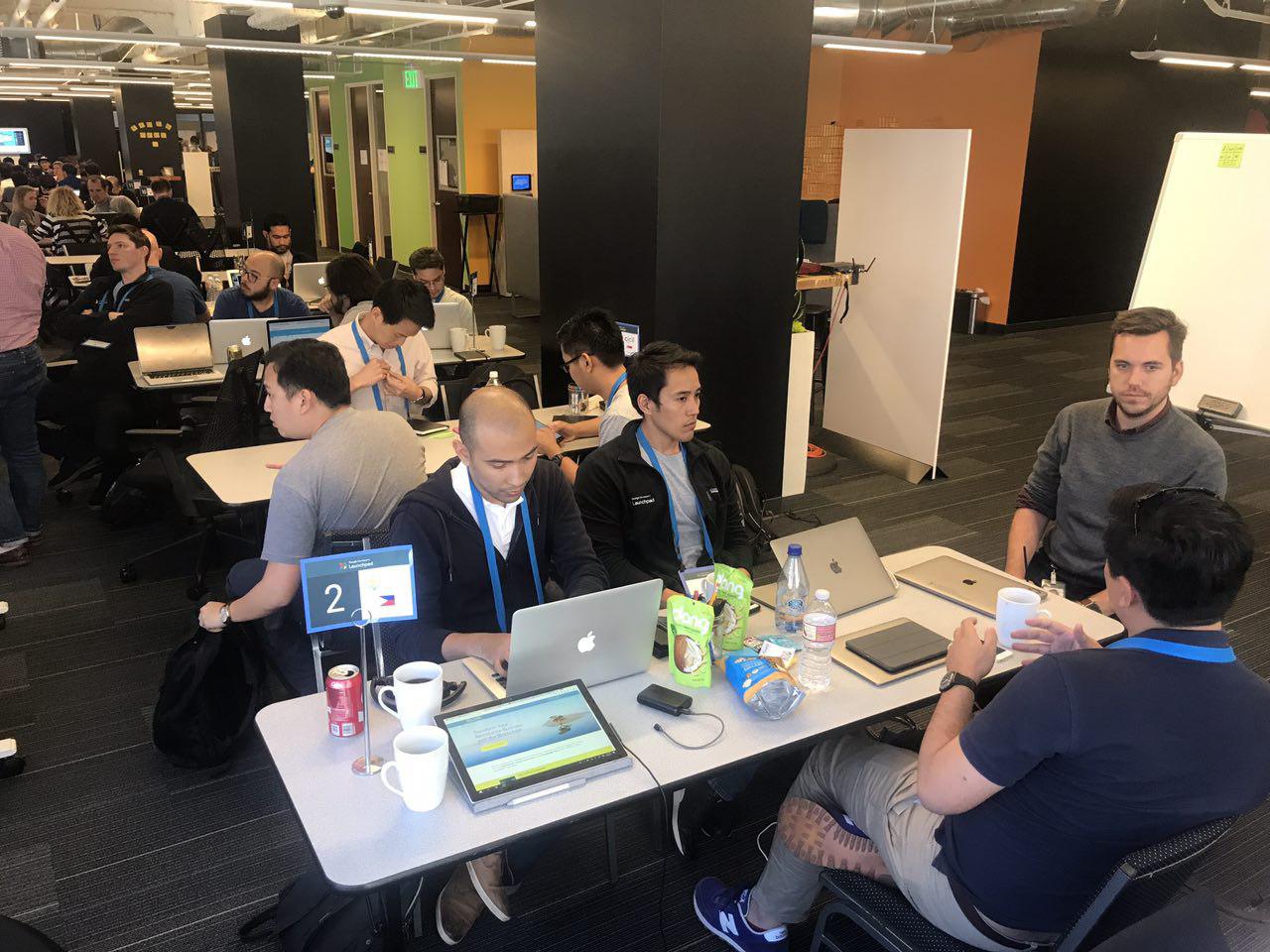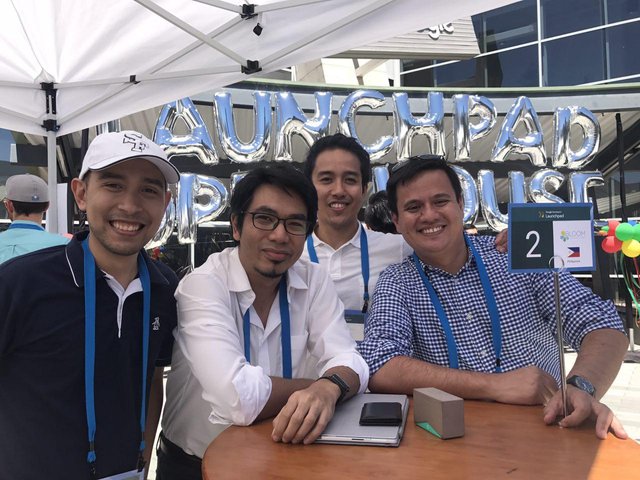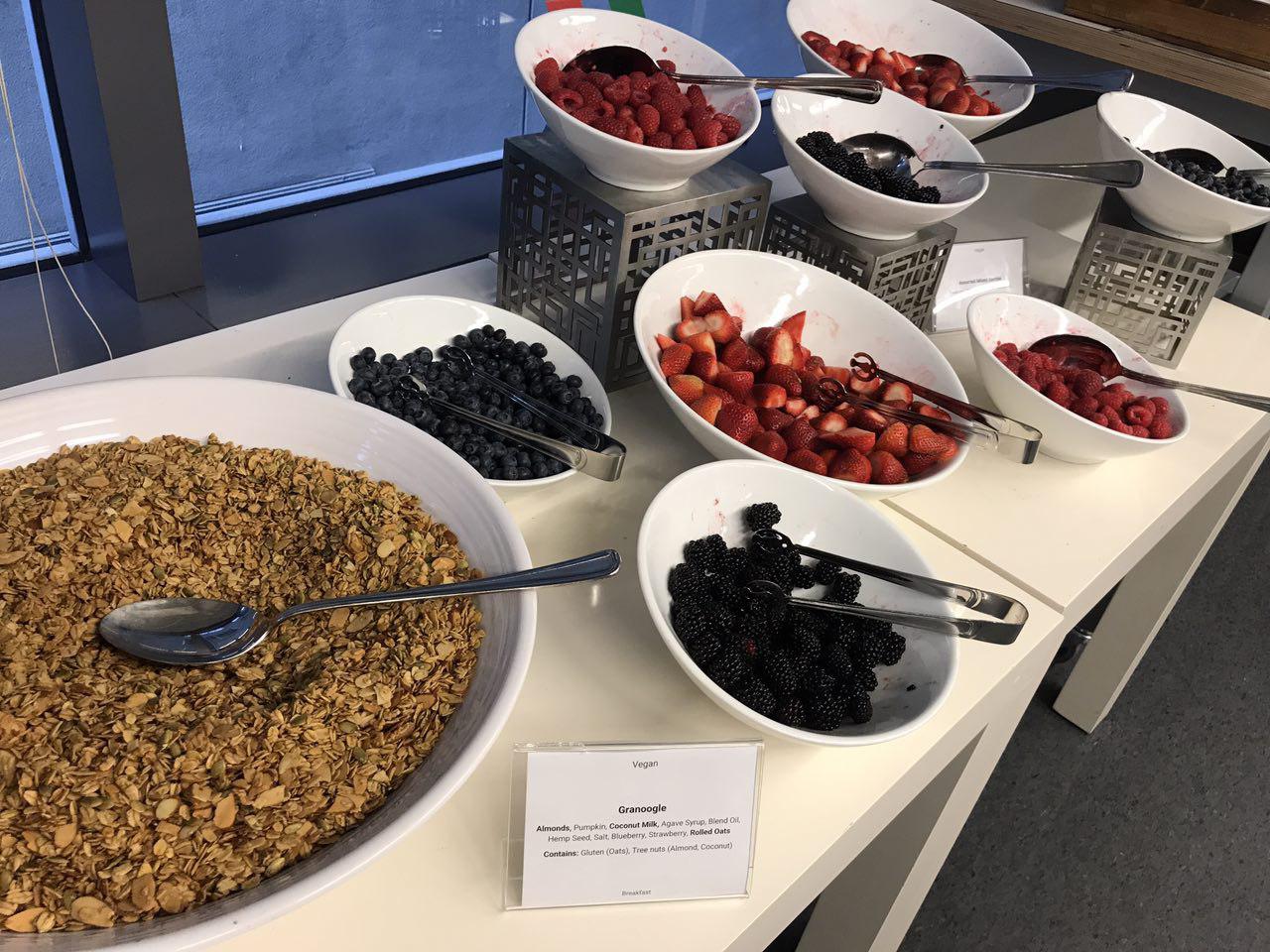Our Bitcoin startup just got back from two weeks at Google accelerator in San Francisco!
On July 14th, four members of the Bloom team flew out to San Francisco to participate in the 4th batch of the Google Launchpad Accelerator, a program for promising startups in emerging markets like Southeast Asia, Latin America, Africa, and Central Europe.
Google LPA starts with a two-week-long bootcamp, during which Bloom and some thirty other startups attended workshops and 1-on-1 mentoring sessions out of the Launchpad space on Howard street in the SOMA area of San Francisco. All 100+ attendees were housed in a Marriott a few blocks away.
This is what the space looked like.

Let the Mentoring Begin
Each day, all the attendees would sit in the meeting hall and listen to talks from notable personalities: one morning, we had Ray Kurzweil; another, Dan Ariely. The rest of the day was then dedicated to mentoring sessions with people from within Google or from industries related to whatever the particular startup was operating in.
The LPA team had spent the 2–3 months prior to the bootcamp looking for mentors in relevant areas for the startups, and I would say that the results were good, but not great.
Now, I have some idea how hard it is to match startups with multiple mentors, as I was involved in a 2-day event in the Philippines a few years ago with just a dozen startups and mentors attending, and the logistics damned near killed us. Google LPA was 10x that size, and probably 100x more complicated to put together.
So although I may sound critical over the next few paragraphs, I need to preface it by saying that I have nothing but respect for the LPA team, and we’re all truly grateful for their efforts. This was a phenomenally difficult thing to pull off and I think that with each new batch, they can only get better.
I should also mention is that Bloom is a B2B API company, and as such we don’t fit the baseline startup mold. For example, we made a very conscious decision not to spend resources on UX this year, and obviously we think about customer acquisition strategies in fundamentally different ways.

Our main goals during the LPA bootcamp was to figure out how to scale our seed-stage business up to a bigger market like North America, and try to learn as much as we could about the implications of a move like that. Think legal, taxation, corporate structure, fundraising, hiring, amongst other things.
Many of our mentors struggled with those parameters.
Nearly all of the internal Google mentors discouraged us from pursuing our aggressive expansion roadmap, and advised us to focus on one country at a time. Several of the external mentors advised us against attempting to raise money in the US, explaining that we would be lost in the sea of unknown startups all vying for attention in the valley. A handful of the more product-oriented mentors talked to us about our messaging and how to obfuscate the technology for customers who weren’t sophisticated enough to appreciate it.
On the face of it, none of that feedback and advice is wrong.
In fact, if I told you nothing about what we do, we could probably agree that, on average, narrowing your focus is good, fundraising in your home region is smart, and keeping your message simple is key.
Unfortunately, there are also some pretty good arguments for why all of the above advice is objectively wrong in the context of our business and trajectory. Among them:
(1) If you build a network in a linear fashion (one country at a time) you’re not fully leveraging what cryptocurrencies allow you to do, i.e., connect to multiple channels quickly and with significantly lower capital outlay.
(2) ASEAN funding sources dry up fast after Series A. If you begin fundraising in the US at an early stage, it gives you enough time (12–18 months, say) to build a credible presence that you can then hopefully leverage in later rounds.
(3) The slightly technical angle of our messaging allows us to filter out customers who don’t currently possess the baseline knowledge to work with us. Our tiny team can only handle a few sales leads at a time, so for now we want to only talk to customers who are further along in the conversion process. Otherwise we end up spending the first few meetings talking about “what a bitcoin is,” which sucks up too much of our time.
Maybe It Should Just be Called Interview Sessions
The fundamental issue is that you can’t really call a 45–60 minute conversation “mentoring,” because the person on the button needs to spend the majority of that time just familiarizing themselves with your business. The complexities of entrepreneurship can’t be reduced to a bunch of eponymous catchphrases, or a set of rules of thumb.
Now, some businesses are simpler than others, so it’s highly likely that other founders came away from their conversations with great ideas and new ways to evaluate their companies. However, we can’t all be “the Uber for X” or “the Tinder for Y.”
In our case, there were a few mentors that spent an entire session arguing with us about strategy even though it was apparent that they possessed a very superficial understanding of our industry, our technology, and our model. After a day or two of that, we learned to quickly pivot those kinds of conversations to something less contentious … like landing pages, Bay area startup gossip, or Google Cloud.
I suppose a more positive way to look at the whole situation is to treat those 30 sessions as if they were “interviews,” and it was up to the founders to reach out to the “interviewers” that expressed a mutual interest in keeping in touch. Mentoring is a relationship, and requires that both parties maintain regular communication over a long period of time. These initial encounters were just the tip of the iceberg.
All that being said, there were definitely a handful of mentors that gave us some really great actionable advice in precisely the areas we were interested in. I believe we had about 30 mentors throughout the two weeks, and there was at least one that we plan to keep in touch with, and a second that we may even do business with.
The Google LPA program lasts for six months, and I assume that over that period, we’d be able to routinely check in with some of those mentors and update them on our progress.
A Word on OKR’s
On the very first day of the program, we sat through a surprisingly long workshop on OKRs, which is Google’s preferred method for individual evaluation. (A bit like KPIs, but you should just watch the video here.)
I’ll go right out and say that I’m pretty anti-process when it comes to early stage businesses, and I think that frameworks have negligible benefit for an 8-person team. At best, they represent yet another piece of documentation that you all need to write at the end of each quarter. At worst, they’re a source of arguments … and it usually comes down to semantics.
Google LPA begins with a day dedicated to learning about OKRs, and then ends with a day defending the OKRs that you’ve formulated for your business in front of a small panel of mentors. I use the word “defending” because our team came in with a very clear set of OKRs, and became progressively more beleaguered and confused as the session wore on.
Two of the mentors on our panel were only mildly familiar with our business, so a lot of the debate came down to the verbiage we had chosen. By the end of it, we had reworded two bullet points, but the underlying intent of our OKRs was essentially unchanged.
I honestly couldn’t tell you if the collective energies of the 10 people in that room had been well-spent rewording those two phrases over 90 minutes.
The Good Stuff
I know that this essay sounds like a long series of complaints, so I thought I’d end with everything I loved about the program.
Everyone in the bootcamp agreed that the Singaporean event crew did a phenomenal job herding 150 people around the various spaces every day and making sure things continued to happen on schedule. No small feat, considering how stubborn entrepreneurs tend to be.
I genuinely enjoyed talking to the other founders. There weren’t many from the fintech or blockchain space, but just trading war stories is always fun. Founders from neighbouring countries were especially useful because it gave us ideas about potential new markets to extend our network to.
Nearly all of the talks were great, especially the futurism-related ones. Because we were doing half a dozen mentoring sessions each day, the talks were a welcome intermission where we could just sit and listen for an hour or two.
Obviously, the monetary support that Google extends is helpful, but more than that, being able to put the Google Launchpad logo on our website is a huge step forward in terms of building credibility. Our startup is almost laughably young relative to some of the traditional business customers we sell our service to, and having the support of a global brand goes a long way towards assuaging their initial trepidation.

Although I complained about some of the advice we were receiving, I should say that no one was ever unkind with their feedback. Everyone was polite, open, and generous with their time. Launchpad managed to bring in several dozen speakers, mentors, and volunteers from all over the world to spend many days interacting with us, and the magnitude of that undertaking is certainly not lost on me.
It’s hard to imagine how anything like this could have existed outside of Silicon Valley. If nothing else, seeing the (literal) embarrassment of riches that this singular place enjoys has been an eye-opening experience.
The Next Six Months
For Bloom, the last half of 2017 will involve regular check-ins with some of the mentors and our program liaisons (they call them “Startup Success Managers”), and we plan to leverage the Google network as much as we can.
Ultimately, whatever we get out of the program is up to us, and being open with our communication and constructive with our feedback is the best way to make that happen. The LPA team has shown that they can maneuver changing circumstances very well, and they don’t wait until the next batch to bring their fixes online.
If you’re a young startup from an emerging economy and are thinking about applying to an accelerator, Launchpad should be a top choice.
— — —
You can learn more about our startup Bloom at our (due-for-an-update) website, or check out my book “Reinventing Remittances with Bitcoin” on Amazon.
Great work guys :) All the best.
This is nice article . I really love this article @helloluis
Scam alert!
Google redirects you to wrong site bltrex with "l" and people were hacked.
https://steemit.com/google/@erez7770/scam-alert
Informative post. Thanks. Wouldn't have heard about this otherwise.
Hey @helloluis , would love to offer you a slot on my podcast sometime.
It is about people doing remarkable things, whether entrepreneurs or not.
Where we talk about what you are doing, believe in and what difference you are making in the world.
It is part youtube channel where the mission is to help 1,000,000 entrepreneurs become remarkable, and the podcast acts as a way to share stories and connect with people.
Here is the playlist of the existing episodes: https://www.youtube.com/playlist?list=PL5CpCNPna6p95oJfKPew0N3ZT0k-khdgg
It is audio only over skype. Would love you to come on the show and talk about yourself. Does this sound of interest to you?
Your post is very useful, I hope I will continue to be able to communicate with you through this community and we will share information, I have business information that is very tempting for you, please check https://steemit.com/business/@ponpase/expo-2017-join-now-2017810t214715198z